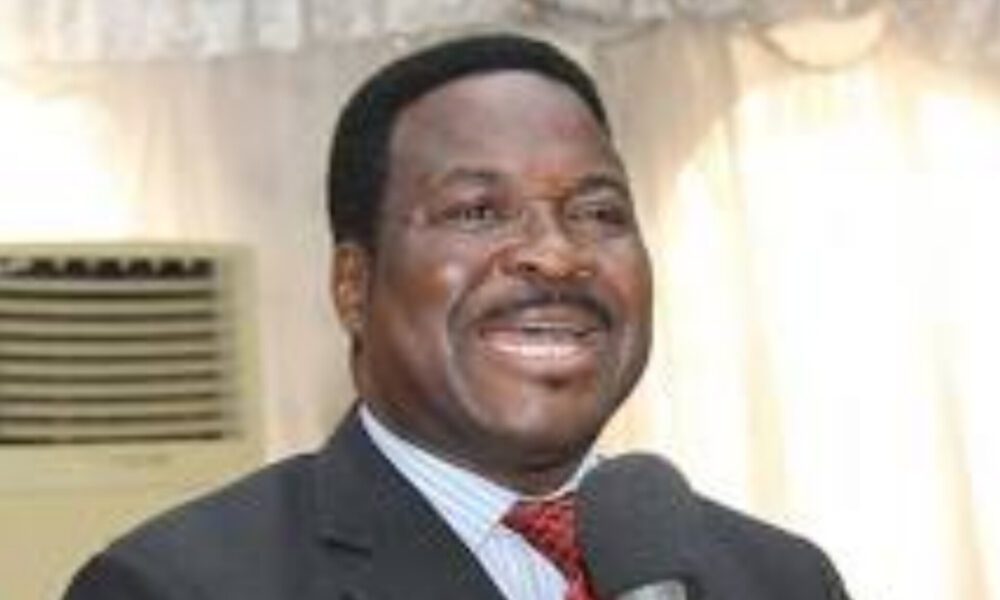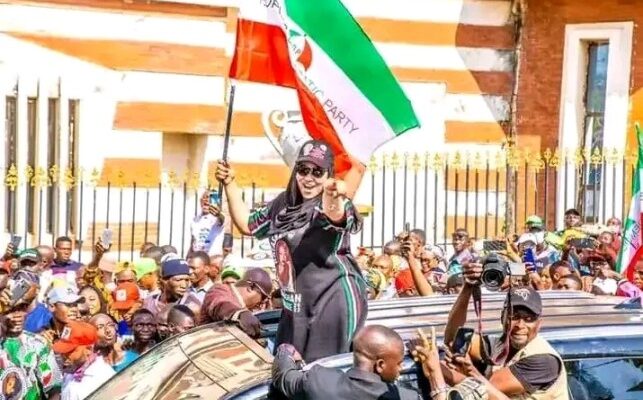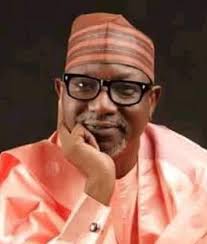By Mike Ozekhome
Introduction
The unfortunate misstep and subsequent fall of President Bola Ahmed Tinubu during this year’s Democracy Day celebrations (which he has since humorously dismissed as a form of Yoruba “dobale” -genuflection)-quickly swirled around and became the stuff of internet gossip and street-corner small-talk. Reactions varied widely but, many tended to make light of it, while others (the usual suspects?) saw it as evidence of the President’s physical incapacity to cope with the tedious demands of his office. Political opportunism also set in, with yet others seeing the mishap as an “I-told you-so moment”, openly voicing their belief that the President’s main opponents in the last election – Atiku Abubakar and Peter Obi (particularly the latter) – would not have suffered that fate, given their presumed better physical fitness.

Some of these remarks were, undoubtedly, uncharitable – especially in the lead-up to the Muslim festival of Id-el-Adha (or Sallah) just a few days away. President Tinubu is, of course, a Muslim. As a fellow human being, he deserves our sympathy and prayers for sound health – an indispensable requirement for the rigours of that job, popularly believed to be one of the most demanding and powerful in the world. With power surely comes huge responsibility and citizens’ expectations for performance. Whether the President scores a pass mark or not in terms of job approval rating is for history (or posterity) to judge. One year is certainly too short to make the conclusion that he has failed. So, let us collectively hold our fire and bid our time. But even at that, no one can deny the fact that Nigerians are in theirs worst years, dying of hunger,squalor and wretchedness. The middle class has been wiped out with less than one percent of state captors enjoying national largesse.Perhaps, the second year in office would be a more appropriate time to asseess him to determine whether the IMF and World Bank-induced economic policies will boost production, create jobs,bring down prices and alleviate the suffering of the Nigerian masses. Suffice it to say that to me,it is yet still early in the day and the jury is still outl.
This is all the more so, in my opinion, because, history is replete with world leaders who put a physical foot (or both feet) wrong (some more than once) and got up, dusted themselves and forged ahead, stamping their feet (pun intended!) on the sands of time, leaving indelible footprints and track records of achievement and performance on the job and in history.The following are a few examples:
I. President Joe Biden: He has famously stumbled on the steps of Air-Force One on at least three occasions, getting back on his feet each time, unassisted and moving on. He is 81 and warming up to run for a second term against maverick Donald Trump.
II. Former President Gerald Ford: One of the most accident-prone world leaders ever , dead or alive,was former US President Gerald Ford. His catalogue of falls spanned virtually every surface, including aircraft steps (again!) while on a visit to Austria in 1975 when his bum knee gave way. He even fell on the stairs of the White House. Though the official reason for this was a bad knee gave way, this did not stop cynics from tagging him as something of a bumbling klutz! Yet, Ford is remembered for managing the worst economy in the four decades after the great depression augmented by spiralling inflation and recession.
III. Ronald Reagan: Yet another former American President, he also endured a similar indignity in 1984 in Seattle, Washington. Luckily for him, it was not captured on video and only still images thereof exist of his so-called pratfall. But he went on to impact on America with his Reaganomics,overhauling the income tax code exempted millions of low income earners.His charm, eloquence and courage after the assassination attempt on him remarkably revived America’s pride in the presidency and the nation.
IV. Barack Obama: This first black American President whose grandfather was a Kenyan cattle rearer also came a-cropper when, sometime in 2015, his trademark sprightly confident jaunt failed him while disembarking from Air Force One. He ended up in a heap, needing no less than 12 stitches to his hip.
V. Hillary Clinton: While the husband of the former First Lady was dodged more by salacious ex-marital stories than physical falls, his wife probably took ‘the Fall’ (pun intended!) when, as Secretary of State to former President Obama, she stumbled while on her way to her car at the State Department, fracturing her elbow in the process.
VI. Robert Mugabe: Sometime in 2015, the former Zimbabwean President Mugabe was famously captured prostrate on a red carpet following a fall at a public event.
VII. Margaret Thatcher: Britain’s first female Prime Minister ( “iron lady” ) also came ‘crashing down’ sometime in 1982 while on a trip to China, as she made her way out of a Town Hall (no pun intended!).
VIII. Thorning-Schmidt: Also in 2015, the then Prime Minister of Denmark (also female) lost her footing and landed on her knees as she disembarked the stairs of the Elysee Palace in Paris, France.
IX. Xi Jinping: the incumbent President of China, came close to falling down during the International Economic Forum in St. Petersburg in Russia in 2019, but for eagle-eyed aides who stepped in at the last moment.
X. Boris Johnson: Another former British Prime Minister, he also lost his balance when he tripped and fell during a military commemorative event in 2015.
XI. Vladimir Putin: Russia’s long-reigning president also fell during a game of ice hockey in Moscow in 2019 when he (ironically) tried to applaud spectators.
Even former Vice President Mike Pence tripped while running up the steps of Airforce One in a remarkably similar circumstances as President Joe Biden. In July, 2023,Fiji Prime Minister, Sitiveni Rabuka,was forced to cancel an official visit to China after falling and hurting his head.
The foregoing shows that President Tinubu is in good company when it comes to presidential falls and that, as stated by a famous sage, it is not falling that matters, but rising each time you fall. However, beyond merely getting up and forging ahead, it is the kind of legacy one lives behind – what one will be remembered for-that counts. Therefore, let us all collectively and individually join hands in the spirit of goodwill echoed by the words of our old (now new) national anthem, in wishing the President a successful (and accident-free!) tenure. We cannot afford for him to fall and fail because we shall be the worse for it and bear the brunt together. The circumstances of his fall, are, however, reminders of the labors of our heroes past (a verse from our now discarded national anthem!) – this time the presumed winner of the June 1993 President, Chief M.K.O. Abiola,who was matyred in redemptive messiahnism.
In this connection, I commend former President Muhammadu Buhari ( as I did in 2018,even though he was not my idea of a good president) for ensuring that the National Assembly passed the requisite law, by which June 12 of every year ( rather than May 29) is marked as a public holiday. I recall my remarks on this issue 6 years ago, on the passage of that law, when I observed as follows;
“On June 12, 2014, I moved a motion at the National Conference that, not only should June 12 be declared a national holiday and the real Democracy day, but that Chief M.K.O. Abiola and all the souls of the faithful departed of those who gallantly lost their lives fighting for the realization of June 12, be remembered and immortalized. I demanded for one minute’s silence for those heroes. The leadership of the Conference led by Justice Idris Legbo Kutigi agreed with me and a minute silence was accordingly observed. To me, it is not the right argument that PMB, did it for political reasons. Yes, he may very well have done it to shore up his battered political image and fast dwindling democratic credentials. But, the inescapable fact is that he has done the right thing for which history will remember him. This is the more reason, I believe the argument should now go, why he should retire quietly to his Daura home, having done one great thing for which he would be remembered.” ( see https//:diplomaticwatch.com,june-12-as-nigeria’s-democracy-day-president-buhari-has-done-the-right-thing-for-which-hhistory-will-rremember-him-ozekhomee-san , june 8,2012).
Lessons of June 2012
I believe that the best way President Tinubu can demonstrate that he has learned the lesson of the tragic events in our national history which that day represents is captured in my advice a year ago. As they it still very pertinent, I would like to reiterate it here:
“What this present government led by President Bola Tinubu should borrow from the June 12 lesson, is good governance of peoples’ policy and not anti-people’s that will further impoverish the already beleaguered people, who are already prostrate on their bellies. Policies that will make life better for the people. But, most importantly, Tinubu must listen to this, even if it is few things he can do. He must take steps to give Nigerians, a peoples’ Constitution, people-driven Constitution made by the people themselves, subjected to a referendum. You cannot amend the present Constitution which is a schedule actually attached to Decree 24 of 1999. It’s a militarily imposed Constitution. No amount of amendment can cure it of its original sin for being made by the military and not by Nigerian people. Even the preamble that says we the peoples of Nigeria do hereby give to ourselves the following Constitutions tells a lie about itself. Therefore, Tinubu must take deliberate steps, to ensure that the Constitution drafting committee, through a constituent assembly of the people, is established and the product that will emerge from it will give Nigeria a true federal system, not the present unitary system where the Federal government controls 67 items on the exclusive legislative list up to how you conduct your marriage through the marriage Act. Until he (Tinubu) makes a people’s Constitution subjected to referendum which will enjoy peoples’ legitimacy as was done in Iraq, Iran, Eritrea, South Africa, Egypt, Tunisia, Kenya,until he takes that deliberate step, Nigeria will continue to suffer of perpetual motion on its axis without progress.” ( see https://www.naijanews.com/2023/06/12/democracy-day-what-tinubu-govt-should-borrow-from-june-12-lesson-ozekhome,12th June,2023). It is clear to me therefore that there is no nexus between the falling of a President and his failure or success. We have all,at one point in time or the other tripped and fallen. It has nothing to do with age-whether old or young. It is just a natural phenomenon to lose balance and fall. Isaac Newton’s Law of Motion regarding gravitational force teaches us that much. It is therefore unhelpful to make a big issue of Tinubu ‘s misstep and fall on June 12,Democracy Day. Given the excruciatingly difficult times we are in,we appear to have completely lost our decency, humanity and sense of empathy,care and affection one for the other.It does not matter whether it is the President or the common man.We must desist from this ungodly trajectory and allow our religious teachings temper our political cravings for blood and vendetta with Godliness.God bless Nigeria.




